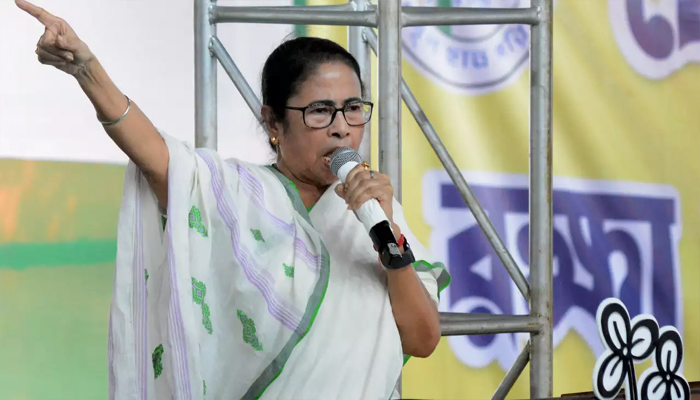The Centre on Friday responded to Bengal Chief Minister Mamata Banerjee’s second letter to Prime Minister Narendra Modi, seeking tougher central laws and exemplary punishment for heinous crimes like rape and murder.
The government slammed the Trinamool Congress chief and said that the information contained in her letter appeared to be a way to “cover up delays”. In a letter to Mamata Banerjee, Union Women and Child Development Minister Annapurna Devi said the Bengal government had not operationalised an additional 11 Fast Track Special Courts (FTSC) to specifically deal with cases of rape and sexual assault on children.
The Centre also informed the Bengal government that stringent laws and exemplary punishments for rape and crimes against women were already in place and urged it to implement them “in letter and spirit”.
“In spite of the pendency of 48,600 rape and Pocso cases in West Bengal, the state has not operationalised additional 11 FTSCs which may be exclusive Pocso courts or combined FTSCs dealing with both rape and Pocso cases, as per the state’s requirement,” Devi said in the letter, a copy of which was posted in her X account.
“As may be seen, the information contained in your letter in this regard is factually incorrect and appears to be a step in the direction to cover up the delays in operationalising the FTSCs by the state,” Devi added in the letter.
Earlier on Friday, Banerjee wrote to PM Modi for the second time, reiterating her request for stringent central legislation and exemplary punishment for heinous crimes like rape and murder.
The West Bengal Chief Minister also wrote to the Prime Minister on the same issue following massive outrage over the rape and murder of a trainee doctor at Kolkata’s RG Kar Medical College and Hospital on August 9. Banerjee had called for mandatory provision for time-bound disposal of cases of rape and murder.
In her letter, Devi, said the West Bengal government established 88 Fast Track Courts (FTCs), which were not the same as the FTSCs covered under the central government scheme.
“The FTCs are set up and funded by the state governments in consultation with the concerned High Courts to handle a broad spectrum of cases such as civil cases involving senior citizens, women, children, disabled persons, litigants affected by HIV-AIDS and other terminal illnesses; and civil disputes related to land acquisition and property/rent disputes pending for over five years including cases of heinous crimes,” the Union Minister told Banerjee in the letter, adding that a total of 81,141 cases were pending in FTCs as of June 30 this year.
On Banerjee’s demand on the need to post permanent judicial officers in FTSCs, the Union Minister said one judicial officer and seven staff will work exclusively to dispose of rape and Protection of Children from Sexual Offences (Pocso) Act cases as per the guidelines.
“Hence, additional charge of FTSCs cannot be given to any permanent judicial officer or court staff. This position was clarified earlier to the West Bengal government in a letter on December 12, 2023, of the Department of Justice, which stated that, in the event of an insufficient workforce, states and UTs have the option to engage judicial officers and court staff on a contractual basis under the FTSC scheme,” Devi said.
She said that stringent punishments for rape/rape with murder already exist in the Bharatiya Nyaya Sanhita (BNS), which prescribes a minimum of 10 years of rigorous imprisonment for rape and extendable up to life imprisonment for the remainder of the natural life of the convict or with death, depending on the severity of the crime.
“As regards, the mandatory provision for disposal of cases in a specific time frame by the trial authorities, I would like to mention that the Bharatiya Nagarik Suraksha Sanhita (BNSS) has the provision of completion of investigation that also includes forensic examination in cases of rape, within two months from the date of FIR and completion of trial within two months from the filing of chargesheet,” Devi added.
“I reiterate that the enactments by the Central Government are comprehensive and stringent enough to tackle the violence and crimes against women. If the state government follows the central legislations in letter and spirit, it will certainly have a lasting impact on strengthening the criminal justice system, bringing the perpetrators of such crimes to face the consequences commensurate with the offence and also ensuring justice for the victims or survivors,” Devi told Banerjee in the letter.
“I once again request you to ensure due sensitisation and positive approach of all duty holders at appropriate levels to ensure proper handling of cases with due care and attention to bring finality as per the timelines prescribed under the statutes,” the letter further read.
Devi’s letter to Banerjee came amid nationwide outrage over the rape and murder of the trainee doctor, whose semi-naked body was found in the seminar hall of RG Kar Medical College and Hospital on August 9. The next day, Sanjoy Roy, a civil volunteer with Kolkata Police, was arrested and sent to judicial custody till September 6.
The Trinamool Congress government in West Bengal has come under fire over the handling of the case, which is being investigated by the Central Bureau of Investigation (CBI).
Protests have been held in Kolkata and other parts of the country demanding justice for the victim and stringent action against the culprits.

